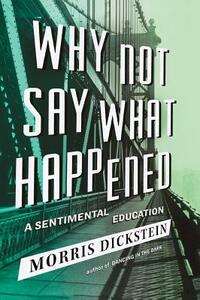Take a photo of a barcode or cover
I'm probably a little biased since Professor Dickstein was my dissertation advisor, and a fabulous professor (I would say that both Jewish American Fiction and The Thirties are the two graduate courses that most directly influenced the direction of my dissertation), but I thoroughly enjoyed reading this intellectual memoir, and I look forward to the next volume!
This is a coming of age memoir by the notable literary critic and cultural historian Morris Dickstein. Trained as a romanticist (doctoral thesis on Keats) he's better known nowadays for having written some broad cultural histories such as Gates of Eden, about the culture of the 1960s. He was born in 1940, lived on the lower east side, and was a Yeshiva boy; then he went to Columbia for college and Yale for graduate school. He spent a year at Cambridge in the UK. We read about his love of learning, his summer vacations, the love of his life, "L.," his friends, and his professional development. The writing style is confident, intimate, and charming. It ends when he's about 30, in 1970.
You'll like this book if you're interested in New York jewry, the New York Intellectuals, the generation of academics who made their bones in the 1960s, 1960s culture (his was the generation that "learned" about rock by hearing it all for the first time), etc.
But there's one audience I want to zero in on. If you're someone who started graduate school after about 1980, you have to read this. I started graduate school for English literature in 1984 and finished in 1993. Dickstein's academic world was a different one in every day. Of course I have always known this, but his memoir was revealing in a number of different ways. I was 24 in 1984; Dickstein was 44. Therefore, Dickstein is an example of the professorial generations that were my teachers and in their prime. Wow, was it different.
The most significant thing is that his generation lived much more poorly than mine did, while simultaneously, the dollar had a lot of buying power overseas. His flats were inevitably extremely seedy and on the wrong side the tracks (I think the newer young grad students have returned to this level, but without the benefits). On the other hand, the dollar went much further outside the USA. There are three trips to Europe in here, and in every one DIckstein is able to visit the continent for months, and travel easily. Recall that the worst economy for new college grades before the great recession of 2007-2008 was 1982-1984. I went to England during college and then during a summer in grad school, and my god, I could barely afford my rent and food.
What this means is that Dickstein could get an extremely broad education in the arts of Europe on a shoestring. For me, it was mostly book-learning and I didn't get much further than London (still, I count my blessings). But I don't think his experience was that unusual for his generation. As I think back on my profs in the mid- to late-1980s, they really did seem more worldly, more traveled, more first-hand intimate with a whole range of the arts. Of course at the time I'm sure I thought it was simply because they were either amazing or older, but now I think some of it derives from the differences in economic opportunity.
Another place where you see a radical difference is in the departure from New Critical-style "close reading" to a generational attention to theory and historical context. One of the blurb-makers for this book describes Dickstein as "Zelig-like," and there's something to that. In college, Dickstein learns about Lukacs and Adorno from friends who have just returned from Europe. He meets Paul deMan. Geoffrey Hartman was a friend. His advisor on his dissertation was Harold Bloom (who had just recently become the 2nd Jew to get tenure in the Yale English department). He takes tutorials in Cambridge from FR Leavis and Raymond Williams. His cohort attends lectures by Derrida and they all read the work as it comes out in French. And so it goes. He eventually became no great lover of the emergent "theory" explosion, but, still, like the LCD Soundsystem song, "he was there."
About my only frustration here is that in some cases last names are shielded. I'm not sure why he did this, because anyone who would really be interested could probably figure it out. For example, he takes a Spenser class at Yale, and he's very coy about which professor it was who only wanted to talk about Plato (maybe Angus Fletcher? Don't know if he taught at Yale then). One of his best friends is only known as "Marshall." It has to be Marshall Berman, who died in 2013. Given that there are other academics here who are named, e.g., Paul Zweig, I'm not sure why the cloak.
You'll like this book if you're interested in New York jewry, the New York Intellectuals, the generation of academics who made their bones in the 1960s, 1960s culture (his was the generation that "learned" about rock by hearing it all for the first time), etc.
But there's one audience I want to zero in on. If you're someone who started graduate school after about 1980, you have to read this. I started graduate school for English literature in 1984 and finished in 1993. Dickstein's academic world was a different one in every day. Of course I have always known this, but his memoir was revealing in a number of different ways. I was 24 in 1984; Dickstein was 44. Therefore, Dickstein is an example of the professorial generations that were my teachers and in their prime. Wow, was it different.
The most significant thing is that his generation lived much more poorly than mine did, while simultaneously, the dollar had a lot of buying power overseas. His flats were inevitably extremely seedy and on the wrong side the tracks (I think the newer young grad students have returned to this level, but without the benefits). On the other hand, the dollar went much further outside the USA. There are three trips to Europe in here, and in every one DIckstein is able to visit the continent for months, and travel easily. Recall that the worst economy for new college grades before the great recession of 2007-2008 was 1982-1984. I went to England during college and then during a summer in grad school, and my god, I could barely afford my rent and food.
What this means is that Dickstein could get an extremely broad education in the arts of Europe on a shoestring. For me, it was mostly book-learning and I didn't get much further than London (still, I count my blessings). But I don't think his experience was that unusual for his generation. As I think back on my profs in the mid- to late-1980s, they really did seem more worldly, more traveled, more first-hand intimate with a whole range of the arts. Of course at the time I'm sure I thought it was simply because they were either amazing or older, but now I think some of it derives from the differences in economic opportunity.
Another place where you see a radical difference is in the departure from New Critical-style "close reading" to a generational attention to theory and historical context. One of the blurb-makers for this book describes Dickstein as "Zelig-like," and there's something to that. In college, Dickstein learns about Lukacs and Adorno from friends who have just returned from Europe. He meets Paul deMan. Geoffrey Hartman was a friend. His advisor on his dissertation was Harold Bloom (who had just recently become the 2nd Jew to get tenure in the Yale English department). He takes tutorials in Cambridge from FR Leavis and Raymond Williams. His cohort attends lectures by Derrida and they all read the work as it comes out in French. And so it goes. He eventually became no great lover of the emergent "theory" explosion, but, still, like the LCD Soundsystem song, "he was there."
About my only frustration here is that in some cases last names are shielded. I'm not sure why he did this, because anyone who would really be interested could probably figure it out. For example, he takes a Spenser class at Yale, and he's very coy about which professor it was who only wanted to talk about Plato (maybe Angus Fletcher? Don't know if he taught at Yale then). One of his best friends is only known as "Marshall." It has to be Marshall Berman, who died in 2013. Given that there are other academics here who are named, e.g., Paul Zweig, I'm not sure why the cloak.

